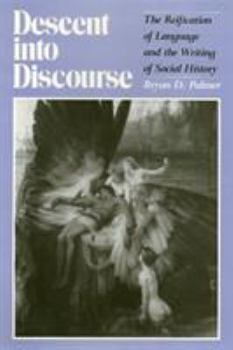Descent Into Discourse: The Reification of Language and the Writing of Social History
(Part of the Critical Perspectives on the Past Series)
Select Format
Select Condition 
Book Overview
"Critical theory is no substitute for historical materialism; language is not life." With this statement, Bryan Palmer enters the debate that is now transforming and disrupting a number of academic disciplines, including political science, women's studies, and history. Focusing on the ways in which literary or critical theory is being promoted within the field of social history, he argues forcefully that the current reliance on poststructuralism--with its reification of discourse and avoidance of the structures of oppression and struggles of resistance--obscures the origins, meanings, and consequences of historical events and processes.
Palmer is concerned with the emergence of "language" as a central focus of intellectual work in the twentieth century. He locates the implosion of theory that moved structuralism in the direction of poststructuralism and deconstruction in what he calls the descent into discourse. Few historians who champion poststructuralist thought, according to Palmer, appreciate historical materialism's capacity to address discourse meaningfully. Nor do many of the advocates of language within the field of social history have an adequate grounding in the theoretical making of the project they champion so ardently. Palmer roots his polemical challenge in an effort to "introduce historians more fully to the theoretical writing that many are alluding to and drawing from rather cavalierly."Acknowledging that critical theory can contribute to an understanding of some aspects of the past, Palmer nevertheless argues for the centrality of materialism to the project of history. In specific discussions of how critical theory is constructing histories of politics, class, and gender, he traces the development of the descent into discourse within social history, mapping the limitations of recent revisionist texts. Much of this writing, he contends, is undertheorized and represents a problematic retreat from prior histories that attempted to address such material forces as economic structures, political power, and class struggle.Descent into Discourse counters current intellectual fashion with an eloquent argument for the necessity to analyze and appreciate lived experience and the structures of subordination and power in any quest for historical meaning.
Format:Paperback
Language:English
ISBN:0877227209
ISBN13:9780877227205
Release Date:January 1990
Publisher:Temple University Press
Length:245 Pages
Weight:0.90 lbs.
Dimensions:0.8" x 6.0" x 9.0"
Customer Reviews
2 ratings
An important work
Published by Thriftbooks.com User , 16 years ago
I had to read this tome in a historiography seminar in grad school and, I must admit, it was difficult going. This was mainly due to the fact that I (and the rest of the participants) was totally unfamiliar with the argument under discussion - the struggle for the meaning of history that was then raging in academe. It had never occurred to us that the poststructuralist critique had leapt the boundry from literary criticism to the social sciences and history. I distinctly remember the baffled remarks of my fellow students when trying to wade into the language and mindset of the new discourse. I had no idea beforehand that I was not only a marxist historian, but a throwback to the von Rankian stoneage to boot. We all thought poststructuralism just another attempt by academics to find a faculty nich by specializing their field and creating another specialist language that only they (and others of like mind) could comprehend. Palmer deflated a lot of that hot air, educated those of us who thought we were pretty well educated to begin with, and along the way makde a pretty good case for the tried and true. Yes, history is an imperfect medium. Has been since the time of Herodatus. Yes, historians have agendas and axes to grind, they have ever since Thucydides. Hey, nothing new here, except the threat of the new discourse in attempting to reduce all historical writing to the level of fiction.
A cogent marxist analysis, but...
Published by Thriftbooks.com User , 24 years ago
This book is above all a defence of Historical Materialism and of the marxist methodology - with a emphasis on classes and concrete class interests - in the writing of History, as opposed to the Structuralist analysis centered on self-sufficient discursive cathegories. It's issue-ordered, with Marxist and Structuralist methodologies contrasted on a issue-to-issue analysis,namely as applied to research on political history, class history, gender, race, and so on. The analysis is cogent and polemical. However, there is something amiss. The emergence of a discourse-based historiograph must be explained by a marxist as something dependent on a concrete and clear-cut class interest, and the author does not explain in whose interest this type of historiograph has developed - which is much more than to merely asess and explain its un-Marxist ccharacter. Anyway, it's a work of reference for all interested in the analysis of methodological issues in the Social Sciences in general, and History in particular.






